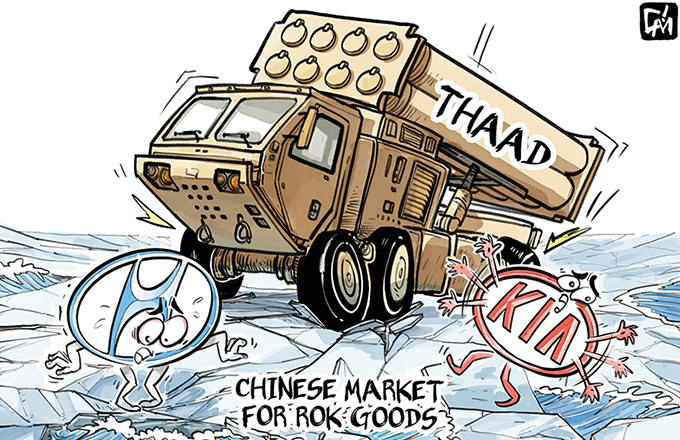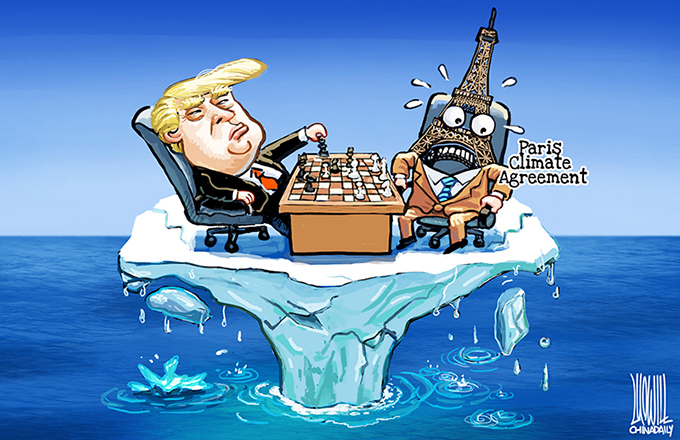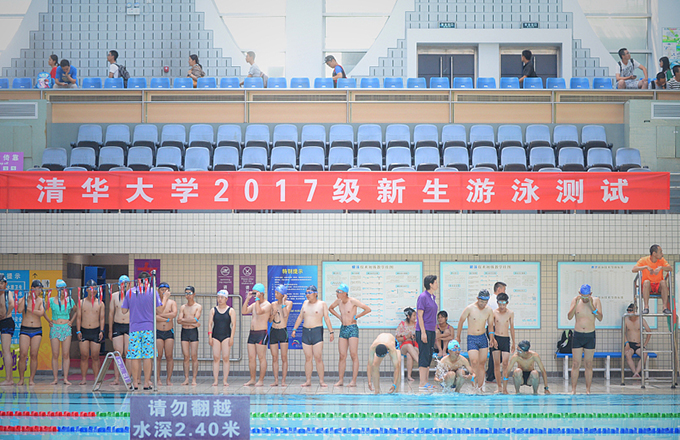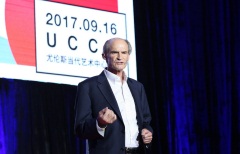Innovation proves driving force in China
Could China's experience and practices be used to solve pressing global problems?
Hunter: In a world where we are seeing an unprecedented tide of rising anti-globalization, China has shown the path forward for forging closer international trade and collaboration. Initiatives such as the Belt and Road and the Asian Infrastructure Investment Bank are based on sound fundamental principles of inclusiveness, mutual benefit and common prosperity for all participants.
Garnier: China sets an example in solving global problems with its experience and practices as the world's most populous country. At present, the government prioritizes anti-corruption and has achieved significant results.
In addition, the sustainable development strategy of Beijing exerts a far-reaching impact on the world. Sustainable development was discussed as an important topic at the G20 Summit in Hangzhou last year.
By promoting stable and comprehensive reforms, China seeks to improve its domestic development model and realize sustainable development. It also provides assistance for developing countries to cope with an international financial crisis.
What will China be like in five years time and what is the country's long-term future?
Hunter: I see China as taking on an increasingly important leadership role in promoting international trade and economic cooperation. Domestically, I anticipate that the rising middle class will continue to provide impetus for sustained economic growth.
Also, I would not be surprised if the country pioneers new technologies and innovations in critical sectors, such as healthcare or renewables. Overall, I am highly upbeat about China's long-term future, and eager for Henkel to be a part of it.
Garnier: I believe the country will be able to maintain its healthy development trend. The friendly and open environment in China provides enterprises with a solid foundation for development. This in turn means that there will be great potential in the future for all sectors, including retail.
What is the most unforgettable experience you have had in China or is related to the country?
Hunter: The most unforgettable experience has been my visit to the Great Wall last year. This is a symbol of China which represents the country's long history and splendid culture.
It was even more magnificent than I had thought, especially with the sunshine and blue sky we had that day. During my visit, I stopped by Henkel's memorial stone, which was built to memorialize the group's donation for the renovation of the Mutianyu section in 1988.
It reminded me of how Henkel started and how much we have accomplished here. I felt very proud.
Garnier: There are two moments that are unforgettable. The first one was in 2015, which marked the 20th anniversary of Carrefour's development here. By then, we had 230 hypermarkets and 10 convenience stores in 58 cities.
I have witnessed the exploration and reform of Carrefour since it entered the market in the 1990s, blazed a trail with Chinese characteristics. Such a remarkable accomplishment was based on stable development and the fast economic growth in China.
The second one was last year and covers reforms in the retail sector. The central government proposed the integration of "offline and online" channels in a bid to support the development of the real economy. Now, with the prosperous development of e-commerce in China, physical retailers are accelerating diversification with the help of big data and new technology.
What will boost growth in the country this year and in 2018?
Hunter: China's clear development agenda and strong leadership bring focus and stability that create a favorable environment for growth, now and in the future. As China transforms to become an innovation-driven economy and upgrades its manufacturing industry, I firmly believe that it will achieve more "quality" growth, to become a true manufacturing power.
Again, in my opinion, the challenge currently facing the Chinese economy is the balance between economic development and sustainability.
Garnier: Openness, cooperation and innovation are the most favorable factors for China's growth. Great efforts have been made by China to develop domestic industries and create a very stable domestic environment. After experiencing staggering growth, China has entered a stable development period. How to use innovation during this period before the next development peak is the biggest challenge faced by the economy.
Honestly, I have my own opinions. Although the economy is developing rapidly, it still suffers from unstable structures in some fields.
For example, with the real estate economy serving as a growth engine in recent years, the structure remains unbalanced. In addition, the country's aging society, education and health will become topics of significant importance.
As a leader with a Fortune 500 company, which sectors do you think offer the most opportunities for development?
Hunter: I see great opportunities for the development of the manufacturing industry. China is fostering smart manufacturing, which is similar to Industry 4.0 in Germany. Both seek to embed automation and digitalization to optimize the manufacturing process, and drive economic growth.
At Henkel, we have consistently grasped the great opportunities provided by digitalization and Industry 4.0. We have successfully piloted the smart factory concept at 10 sites across Asia. We want to accelerate digitalization along the entire value chain to achieve faster decision making, higher productivity, and greater safety and sustainability.
In addition, e-commerce in China is leading the world and will provide tremendous opportunities in the future. We have been taking this opportunity to cooperate with e-commerce platforms. For example, our beauty care business achieved great success on Alibaba. Our adhesive business also launched its flagship store on Alibaba.
Garnier: I think there are two. The first are innovation-based industries with new technology and high quality services. With the rise of the middle class, people's consumption demands have been transformed gradually from prices and costs to the pursuit of lifestyle.
That is why we launched the "multi-format and multi-channel strategy". Scientific innovation has become a driving force for development. In the future, high quality produce, will be extremely popular with customers.
Secondly, sustainable industries such as health, cultural and environmental protection will promote China's status on the global stage. After all, sustainable development is a topic that the entire world is concerned about.
What opportunities will the Belt and Road Initiative throw up for China and the rest of the world?
Hunter: The Belt and Road Initiative creates considerable demand for products, investment and economic cooperation. It stimulates the expansion and upgrading of China's manufacturing industry, as well as providing greater market opportunities for the development of China's economy.
As a multinational company, we are delighted to help facilitate the upgrading of China's manufacturing industry and grasp the market opportunities generated by cooperation. The Belt and Road Initiative has also set a great example for international cooperation. This will strengthen the foundation for the long-term stable growth of the world's economy.
Garnier: China has developed economic partnerships with economies along the Belt and Road Initiative. I see it as a 21st century "Silk Road "and an extremely admirable project. China always embraces societies with openness and inclusion.
The country has established friendly relationships with neighbors and promotes cooperation and collaboration with major nations.
What are the most innovative trends or products in China?
Hunter: The country is implementing the "Internet Plus" initiative, which aims to transform and upgrade industries through the internet and digitalization. At Henkel, we have a similar agenda to leverage digitalization and Industry 4.0 to accelerate our business growth, better serve our customers, optimize our processes and transform the entire company.
Garnier: I believe there will be strong growth in electronic products. With accelerated upgrading and improved quality of electronic devices, prices become increasingly affordable for consumers.
Electronic products that were expensive and seldom available in supermarkets in the past can now be found in our stores, as living standards here rise and prices fall.
China is known as a manufacturing giant, but what will be the country's "calling card" in the future?
Hunter: As it transforms into an innovation-driven economy, innovation will be the country's core competency. China has already demonstrated its potential for innovation in areas such as the internet, and there will be more in the future. The scale of its economy and the availability of investment capital provide fertile soil for more innovation to take root and blossom.
Garnier: I believe it will eventually become the world's No 1 market because of stable growth and global strategic cooperation. With a consumer market of 1.3 billion people, China has become the world's largest import and export market.
Such a huge market will definitely attract the investment of overseas resources and bring a great number of opportunities. This will significantly contribute to enhancing China's competitiveness.
- Global innovation forum attracts business leaders
- Xi'an innovation incubation district provides world-class support
- Innovation pushed for e-pay systems
- Investment and innovation efforts pay off as improvements continue
- China concentrates on sci-tech innovation
- Global innovation conference concludes in Shenyang



















